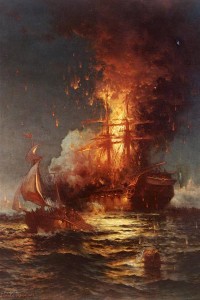Good morning.
Sunday presents a chance of flurries and a high of twenty-two for Whitewater.
We’ve only one moon, but Jupiter has many, including the largest in the solar system, Ganymede. NASA Voyager probes and Galileo mission collectively filmed the surface of Ganymede (a satellite bigger even than the planet Mercury) to produce a map the Jovian satellite:
On February 16, 1804, the ‘most daring act of the age’:
During the First Barbary War, U.S. Lieutenant Stephen Decatur leads a military mission that famed British Admiral Horatio Nelson calls the “most daring act of the age.”
In June 1801, President Thomas Jefferson ordered U.S. Navy vessels to the Mediterranean Sea in protest of continuing raids against U.S. ships by pirates from the Barbary states–Morocco, Algeria, Tunis, and Tripolitania. American sailors were often abducted along with the captured booty and ransomed back to the United States at an exorbitant price. After two years of minor confrontations, sustained action began in June 1803 when a small U.S. expeditionary force attacked Tripoli harbor in present-day Libya.
In October 1803, the U.S. frigate Philadelphia ran aground near Tripoli and was captured by Tripolitan gunboats. The Americans feared that the well-constructed warship would be both a formidable addition to the Tripolitan navy and an innovative model for building future Tripolitan frigates. Hoping to prevent the Barbary pirates from gaining this military advantage, Lieutenant Stephen Decatur led a daring expedition into Tripoli harbor to destroy the captured American vessel on February 16, 1804.
After disguising himself and his men as Maltese sailors, Decatur’s force of 74 men, which included nine U.S. Marines, sailed into Tripoli harbor on a small two-mast ship. The Americans approached the USS Philadelphia without drawing fire from the Tripoli shore guns, boarded the ship, and attacked its Tripolitan crew, capturing or killing all but two. After setting fire to the frigate, Decatur and his men escaped without the loss of a single American. The Philadelphia subsequently exploded when its gunpowder reserve was lit by the spreading fire.
Six months later, Decatur returned to Tripoli Harbor as part of a larger American offensive and emerged as a hero again during the so-called “Battle of the Gunboats,” a naval battle that saw hand-to-hand combat between the Americans and the Tripolitans.

